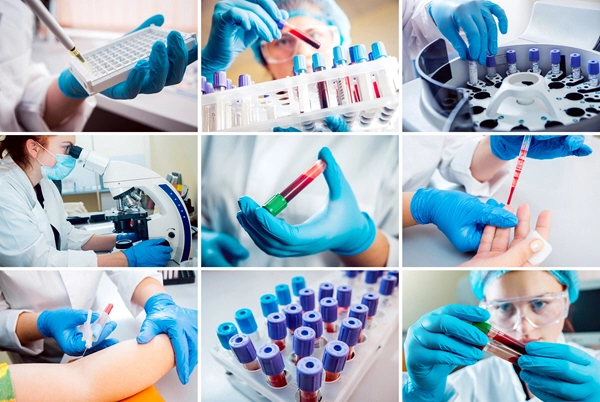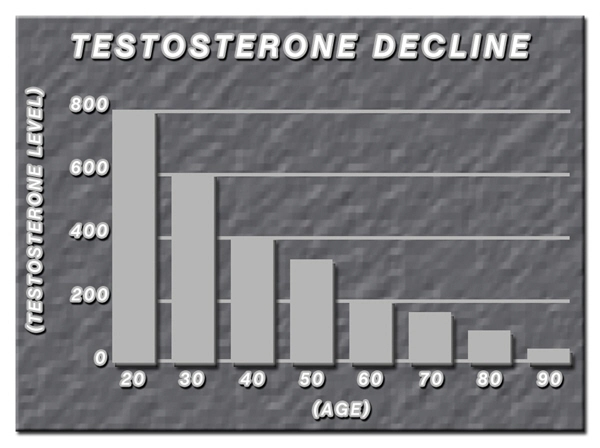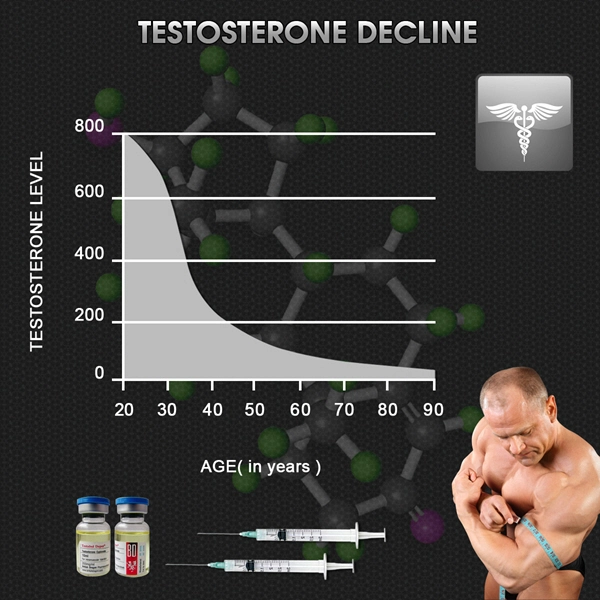Introduction
Testosterone Cypionate, a commonly prescribed form of testosterone replacement therapy, has been widely used to treat hypogonadism in American males. As the prevalence of testosterone deficiency increases, understanding the impact of this therapy on the genitourinary system becomes crucial for healthcare providers and patients alike. This article delves into the effects of Testosterone Cypionate on the genitourinary health of American males, highlighting both the benefits and potential risks associated with its use.
Mechanism of Action
Testosterone Cypionate is an esterified form of testosterone that is slowly released into the bloodstream after intramuscular injection. This slow release helps maintain stable serum testosterone levels, mimicking the natural circadian rhythm of testosterone production. The primary function of testosterone is to stimulate the development and maintenance of male sexual characteristics, including the genitourinary system.
Positive Effects on the Genitourinary System
One of the most notable benefits of Testosterone Cypionate on the genitourinary system is the improvement in erectile function. Hypogonadal men often experience erectile dysfunction due to low testosterone levels. By restoring these levels, Testosterone Cypionate can significantly enhance sexual function, leading to improved quality of life.
Additionally, Testosterone Cypionate can increase libido, which is often diminished in men with low testosterone. This increase in sexual desire can have a positive impact on relationships and overall well-being. Furthermore, testosterone therapy has been shown to improve urinary symptoms associated with benign prostatic hyperplasia (BPH) in some men, although the evidence is not entirely consistent.
Potential Risks and Side Effects
While Testosterone Cypionate offers several benefits, it is not without potential risks. One of the primary concerns is the potential for exacerbating or inducing BPH. Although some studies suggest that testosterone therapy does not increase the risk of BPH, others indicate a possible association, particularly in men with pre-existing prostate conditions.
Another significant risk is the potential for testosterone therapy to increase the risk of prostate cancer. The relationship between testosterone and prostate cancer remains controversial, with some research suggesting that testosterone may promote the growth of existing prostate cancer cells. Therefore, men with a history of prostate cancer or those at high risk should be closely monitored while on Testosterone Cypionate.
Additionally, Testosterone Cypionate can lead to changes in the genitourinary system, such as testicular atrophy. This occurs because exogenous testosterone can suppress the body's natural production of testosterone, leading to a decrease in testicular size and function. Regular monitoring and potential use of human chorionic gonadotropin (hCG) can help mitigate this risk.
Monitoring and Management
Given the potential risks associated with Testosterone Cypionate, regular monitoring is essential. Healthcare providers should conduct baseline assessments of prostate health, including digital rectal exams and prostate-specific antigen (PSA) levels, before initiating therapy. Follow-up monitoring should be performed at regular intervals to detect any changes in prostate health or other genitourinary issues.
Patients should be educated about the signs and symptoms of potential side effects, such as urinary difficulties, changes in urination patterns, or any new lumps or masses in the genital area. Prompt reporting of these symptoms can facilitate early intervention and management.
Conclusion
Testosterone Cypionate can significantly improve genitourinary health in American males with hypogonadism, enhancing erectile function, libido, and potentially alleviating some urinary symptoms. However, the therapy is not without risks, including potential exacerbation of BPH, increased risk of prostate cancer, and testicular atrophy. Close monitoring and patient education are crucial to maximizing the benefits of Testosterone Cypionate while minimizing its risks. As research continues to evolve, healthcare providers must stay informed to provide the best possible care for their patients.

- Testosterone Cypionate: Managing Low Levels in Aging American Men [Last Updated On: January 11th, 2026] [Originally Added On: February 21st, 2025]
- Testosterone Cypionate: Managing Chronic Conditions in American Men [Last Updated On: March 17th, 2025] [Originally Added On: March 17th, 2025]
- Testosterone Cypionate Therapy: Insurance, Providers, and Lifestyle for Optimal Male Health [Last Updated On: March 17th, 2025] [Originally Added On: March 17th, 2025]
- Testosterone Cypionate's Impact on Sleep Patterns in American Males: A Comprehensive Analysis [Last Updated On: March 18th, 2025] [Originally Added On: March 18th, 2025]
- Testosterone Cypionate: Enhancing Mental Clarity in American Men - Experiences and Insights [Last Updated On: March 18th, 2025] [Originally Added On: March 18th, 2025]
- Testosterone Cypionate: Medical Uses and Social Stigma in American Males [Last Updated On: March 19th, 2025] [Originally Added On: March 19th, 2025]
- Mastering Testosterone Cypionate Injections: A Guide for American Males [Last Updated On: March 20th, 2025] [Originally Added On: March 20th, 2025]
- Testosterone Cypionate: Benefits, Risks, and Prostate Health Monitoring for American Men [Last Updated On: March 21st, 2025] [Originally Added On: March 21st, 2025]
- Testosterone Cypionate: A Potential Aid in Weight Management for American Men [Last Updated On: March 21st, 2025] [Originally Added On: March 21st, 2025]
- Testosterone Cypionate's Effects on Skin Health in American Men: Acne, Elasticity, Hair [Last Updated On: March 21st, 2025] [Originally Added On: March 21st, 2025]
- Testosterone Cypionate: Enhancing Libido in American Males - Benefits and Risks [Last Updated On: March 22nd, 2025] [Originally Added On: March 22nd, 2025]
- Testosterone Cypionate: Debunking Myths and Presenting Facts for American Men's Health [Last Updated On: March 22nd, 2025] [Originally Added On: March 22nd, 2025]
- Long-term Testosterone Cypionate Use: Impacts on American Men's Health [Last Updated On: March 22nd, 2025] [Originally Added On: March 22nd, 2025]
- Managing Testosterone Cypionate Side Effects: Strategies for American Men on TRT [Last Updated On: March 22nd, 2025] [Originally Added On: March 22nd, 2025]
- Testosterone Cypionate's Impact on Emotional Well-being in American Men [Last Updated On: March 22nd, 2025] [Originally Added On: March 22nd, 2025]
- Testosterone Cypionate Therapy: Costs, Coverage, and Cost-Saving Strategies for American Males [Last Updated On: March 22nd, 2025] [Originally Added On: March 22nd, 2025]
- Testosterone Cypionate: Enhancing Diabetes Management in American Males [Last Updated On: March 23rd, 2025] [Originally Added On: March 23rd, 2025]
- Testosterone Cypionate's Impact on Immune Function in American Males: Latest Research [Last Updated On: March 23rd, 2025] [Originally Added On: March 23rd, 2025]
- Testosterone Cypionate: A Vital Tool for Transgender American Males' Transition [Last Updated On: March 23rd, 2025] [Originally Added On: March 23rd, 2025]
- Testosterone Cypionate: Benefits, Risks, and Guidelines for Hypogonadism Treatment [Last Updated On: March 23rd, 2025] [Originally Added On: March 23rd, 2025]
- Testosterone Cypionate's Impact on Vision Health in American Males: Benefits and Risks [Last Updated On: March 24th, 2025] [Originally Added On: March 24th, 2025]
- Testosterone Cypionate's Impact on Kidney Function in American Men: A Comprehensive Review [Last Updated On: March 24th, 2025] [Originally Added On: March 24th, 2025]
- Testosterone Cypionate's Impact on Cholesterol Levels in American Men: Risks and Management [Last Updated On: March 24th, 2025] [Originally Added On: March 24th, 2025]
- Testosterone Cypionate's Impact on Liver Health in American Males: Risks and Management [Last Updated On: March 24th, 2025] [Originally Added On: March 24th, 2025]
- Testosterone Cypionate: A Promising Treatment for Depression in American Males [Last Updated On: March 24th, 2025] [Originally Added On: March 24th, 2025]
- Testosterone Cypionate's Impact on Digestive Health in American Men: A Comprehensive Review [Last Updated On: March 24th, 2025] [Originally Added On: March 24th, 2025]
- Testosterone Cypionate's Impact on Male Pattern Baldness in American Men: Mechanisms and Management [Last Updated On: March 24th, 2025] [Originally Added On: March 24th, 2025]
- Testosterone Cypionate: Monitoring Blood Levels for Safe, Effective Therapy in American Men [Last Updated On: March 25th, 2025] [Originally Added On: March 25th, 2025]
- Testosterone Cypionate's Impact on Blood Pressure in American Men: A Comprehensive Review [Last Updated On: March 25th, 2025] [Originally Added On: March 25th, 2025]
- Testosterone Cypionate's Impact on Hearing Health in American Men: An Emerging Link [Last Updated On: March 25th, 2025] [Originally Added On: March 25th, 2025]
- Testosterone Cypionate's Impact on Joint Health: Benefits and Risks for American Men [Last Updated On: March 25th, 2025] [Originally Added On: March 25th, 2025]
- Testosterone Cypionate: A Promising Treatment for Chronic Fatigue in American Males [Last Updated On: March 25th, 2025] [Originally Added On: March 25th, 2025]
- Testosterone Cypionate and Hair Loss: Mechanisms, Risks, and Management for American Men [Last Updated On: March 25th, 2025] [Originally Added On: March 25th, 2025]
- Testosterone Cypionate: Enhancing Cognitive Function in American Men with Low Testosterone [Last Updated On: March 25th, 2025] [Originally Added On: March 25th, 2025]
- Testosterone Cypionate: Balancing Benefits and Cardiovascular Risks in American Men [Last Updated On: March 25th, 2025] [Originally Added On: March 25th, 2025]
- Testosterone Cypionate's Impact on Red Blood Cell Production in American Men on TRT [Last Updated On: March 26th, 2025] [Originally Added On: March 26th, 2025]
- Testosterone Cypionate: Enhancing Injury Recovery in American Males [Last Updated On: March 26th, 2025] [Originally Added On: March 26th, 2025]
- Testosterone Cypionate: Legal Status and Prescription Guidelines for American Males [Last Updated On: March 27th, 2025] [Originally Added On: March 27th, 2025]
- Testosterone Cypionate: Enhancing Energy in American Men with Low Testosterone [Last Updated On: March 27th, 2025] [Originally Added On: March 27th, 2025]
- Testosterone Cypionate: Benefits, Risks, and Safe Usage for American Men [Last Updated On: March 27th, 2025] [Originally Added On: March 27th, 2025]
- Testosterone Cypionate's Impact on Mental Health in American Males: Benefits and Risks [Last Updated On: March 27th, 2025] [Originally Added On: March 27th, 2025]
- Testosterone Cypionate: Enhancing Muscle, Reducing Fat in American Men's Health [Last Updated On: March 27th, 2025] [Originally Added On: March 27th, 2025]
- Testosterone Cypionate's Impact on Neurological Health in American Men: A Comprehensive Review [Last Updated On: March 27th, 2025] [Originally Added On: March 27th, 2025]
- Testosterone Cypionate: A Novel Approach to Osteoporosis in American Males [Last Updated On: March 28th, 2025] [Originally Added On: March 28th, 2025]
- Testosterone Cypionate: A Promising Treatment for Allergies in American Males [Last Updated On: March 28th, 2025] [Originally Added On: March 28th, 2025]
- Testosterone Cypionate: A Promising Therapy for Autoimmune Disorders in American Men [Last Updated On: March 28th, 2025] [Originally Added On: March 28th, 2025]
- Testosterone Cypionate: Potential Benefits for Acne, Psoriasis, and Eczema in American Males [Last Updated On: March 29th, 2025] [Originally Added On: March 29th, 2025]
- Testosterone Cypionate's Impact on Lung Function in American Men: Recent Findings [Last Updated On: March 29th, 2025] [Originally Added On: March 29th, 2025]
- Testosterone Cypionate's Impact on Thyroid Function in American Males: A Comprehensive Analysis [Last Updated On: March 29th, 2025] [Originally Added On: March 29th, 2025]
- Testosterone Cypionate: A Novel Pain Management Strategy for American Males [Last Updated On: March 29th, 2025] [Originally Added On: March 29th, 2025]
- Testosterone Cypionate's Impact on Dental Health: Insights for American Men on TRT [Last Updated On: March 30th, 2025] [Originally Added On: March 30th, 2025]
- Testosterone Cypionate's Impact on Eye Health in American Men: A Comprehensive Review [Last Updated On: March 30th, 2025] [Originally Added On: March 30th, 2025]
- Testosterone Cypionate: Effects, Risks, and Management for American Men [Last Updated On: April 1st, 2025] [Originally Added On: April 1st, 2025]
- Testosterone Cypionate: A Promising Therapy for Respiratory Health in American Males [Last Updated On: April 2nd, 2025] [Originally Added On: April 2nd, 2025]
- Testosterone Cypionate: Impacts on Male Reproductive Health in American Males [Last Updated On: April 4th, 2025] [Originally Added On: April 4th, 2025]
- Testosterone Cypionate's Impact on Urinary Health in American Men: A Comprehensive Review [Last Updated On: April 5th, 2025] [Originally Added On: April 5th, 2025]
- Testosterone Cypionate: Managing Metabolic Disorders in American Males [Last Updated On: April 6th, 2025] [Originally Added On: April 6th, 2025]
- Testosterone Cypionate: Enhancing Musculoskeletal Health in American Males [Last Updated On: April 6th, 2025] [Originally Added On: April 6th, 2025]
- Testosterone Cypionate's Impact on Gastrointestinal Health in American Males: A Comprehensive Review [Last Updated On: April 7th, 2025] [Originally Added On: April 7th, 2025]
- Testosterone Cypionate's Cardiovascular Effects: Risks, Benefits, and Management Strategies [Last Updated On: April 7th, 2025] [Originally Added On: April 7th, 2025]
- Testosterone Cypionate's Impact on Immune System in American Men: Risks and Benefits [Last Updated On: April 9th, 2025] [Originally Added On: April 9th, 2025]
- Testosterone Cypionate's Impact on Skin Health in American Men: Effects and Management [Last Updated On: April 9th, 2025] [Originally Added On: April 9th, 2025]
- Testosterone Cypionate's Role in Treating Neurological Disorders in American Males [Last Updated On: April 10th, 2025] [Originally Added On: April 10th, 2025]
- Testosterone Cypionate: Effects on Genitourinary System in American Men [Last Updated On: April 10th, 2025] [Originally Added On: April 10th, 2025]
- Testosterone Cypionate's Impact on Respiratory Health in American Men: Benefits and Risks [Last Updated On: April 12th, 2025] [Originally Added On: April 12th, 2025]
- Testosterone Cypionate: Impacts on Muscle, Bone Health in American Males [Last Updated On: April 12th, 2025] [Originally Added On: April 12th, 2025]
- Testosterone Cypionate's Impact on Kidney Function: Risks and Management Strategies [Last Updated On: April 13th, 2025] [Originally Added On: April 13th, 2025]
- Testosterone Cypionate's Emerging Role in Treating Hematological Disorders in American Males [Last Updated On: April 13th, 2025] [Originally Added On: April 13th, 2025]
- Testosterone Cypionate: Managing Endocrine Disorders in American Males [Last Updated On: April 15th, 2025] [Originally Added On: April 15th, 2025]
- Testosterone Cypionate: Psychiatric Impacts on American Men's Mental Health [Last Updated On: April 15th, 2025] [Originally Added On: April 15th, 2025]
- Testosterone Cypionate: Exploring Its Use in Dermatology for American Males [Last Updated On: April 16th, 2025] [Originally Added On: April 16th, 2025]
- Testosterone Cypionate's Impact on Hemoglobin and Hematocrit in American Men [Last Updated On: April 17th, 2025] [Originally Added On: April 17th, 2025]
- Testosterone Cypionate: A Promising Therapy for Respiratory Disorders in American Males [Last Updated On: April 17th, 2025] [Originally Added On: April 17th, 2025]
- Testosterone Cypionate's Psychiatric Impact on American Men: Benefits and Risks [Last Updated On: April 18th, 2025] [Originally Added On: April 18th, 2025]
- Testosterone Cypionate's Impact on Gastrointestinal Health in American Men [Last Updated On: April 19th, 2025] [Originally Added On: April 19th, 2025]
- Testosterone Cypionate: Impacts on Male Endocrine System and Therapeutic Considerations [Last Updated On: April 19th, 2025] [Originally Added On: April 19th, 2025]
- Testosterone Cypionate's Neurological Impact on American Men: Benefits and Risks [Last Updated On: April 20th, 2025] [Originally Added On: April 20th, 2025]
- Testosterone Cypionate's Role in Managing Renal Disorders in American Males: Emerging Evidence [Last Updated On: April 20th, 2025] [Originally Added On: April 20th, 2025]
- Testosterone Cypionate: Effective Hypogonadism Treatment for American Men [Last Updated On: April 20th, 2025] [Originally Added On: April 20th, 2025]
- Testosterone Cypionate: Benefits, Risks, and Impact on American Male Health [Last Updated On: April 21st, 2025] [Originally Added On: April 21st, 2025]



List of USA state clinics - click a flag below for blood testing clinics.
Word Count: 586


















































